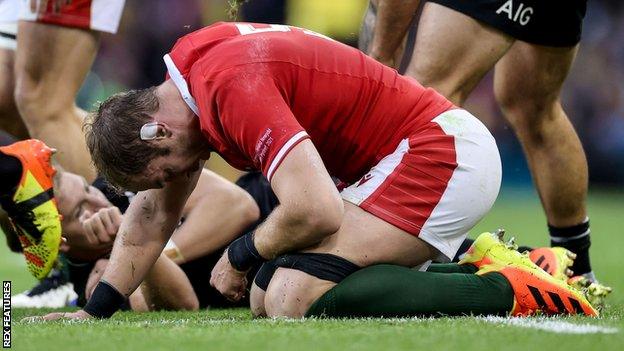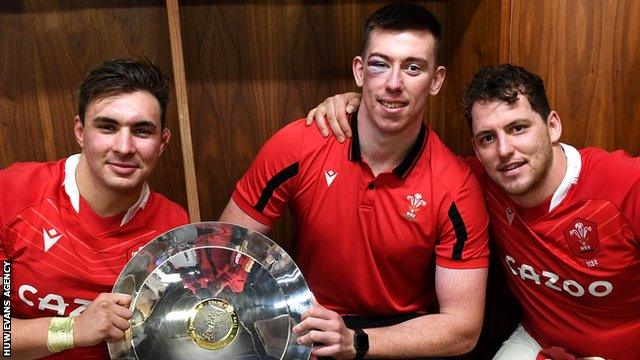Alun Wyn Jones: Wales captain requires second operation on injured shoulder
- Published

Alun Wyn Jones suffered the shoulder injury tackling New Zealand's Jordie Barrett
United Rugby Championship: Connacht v Ospreys |
|---|
Venue: Sportsground, Galway Date: Friday 26 November Time: 19:35 GMT |
Coverage: Reports and highlights on BBC Sport website and app. Live on S4C, highlights on Scrum V, BBC Two Wales and online, Sunday 28 November from 18:15 and later on demand |
Wales captain Alun Wyn Jones requires a second operation on the shoulder injury suffered against New Zealand in October.
Wales coach Wayne Pivac had already indicated Jones would miss the 2022 Six Nations and now the 36-year-old will have more surgery.
Ospreys coach Toby Booth says he is confident Jones will play again this season.
"He has had one operation, and he needs a second," said Booth.
"So we won't really know (what happens) until the second one is done, which is in a couple of weeks.
"We will see where that is and what that gives us. With all the best scans in the world, until you get in there, you don't really know."
Jones suffered a shoulder injury playing for the British and Irish Lions against Japan in June which initially appeared to have ruled him out of the tour of South Africa.
He made a remarkable recovery to captain the Lions in all three Tests against the Springboks.
Jones picked up his latest problem against the All Blacks on 30 October, his 161st international.
Booth says Jones believes he will return before the end of the 2021-22 campaign.
"He is very confident, and that's Al for you, and we will put everything around him to make is recovery as quick as possible," Booth added.
"The worst thing you can say to Al is that he won't do something.
"He has got the attitude and mindset, and that's what sets him apart from a lot of other people. We will get him back as fast as his mind and his body allow. We are pretty confident about that."
There was more encouraging news on fellow Ospreys, Wales and Lions lock Adam Beard, who suffered a nasty facial injury against Australia but no structural damage.

Adam Beard (C) was still able to join team-mates Taine Basham (L) and Ryan Elias to celebrate beating Australia after his injury
Beard was the victim of head-on-head tackle from Rob Valetini, who received a red card.
"When you see something like that the first concern was he is okay," said Booth.
"I was in contact with him in the evening and he was quite coherent.
"He got a nice black eye and a lot of stitches but he is recovering well. He is on a down week and won't be involved this weekend for obvious reasons, especially on a short turnaround.
"He is safe and healthy with his family. Just a head injury assessment recovery and some external damage."
As well as Beard, fellow Wales squad members Gareth Anscombe and Alex Cuthbert will not face Connacht in the United Rugby Championship on Friday as Ospreys continue to monitor their returns after long-term injury.
Lock Rhys Davies and prop Gareth Thomas are in line to feature in Galway.
Long-term returns
Wales and Lions flanker Justin Tipuric is targeting a return around Christmas after suffering a shoulder injury against Japan in June.
George North is not expected back until 2022 after suffering a knee injury in April but hooker Dewi Lake is back in full training and should return in the next few weeks.
"Justin has been training with us in non-contact stuff, so we believe he is on track," added Booth.
"George is not due to be back until the new year and Dan Lydiate's on the same kind of timeline.
"He (Lydiate) is probably looking into the new year but, again, the signs have been very encouraging to this point.
"Dewi Lake's in full training, so once we get a couple of weeks into him he'll be available. That's the real positive."
On whether North will be fit for the 2022 Six Nations, Booth responded: "I can't answer that.
"Often with long-term injuries, the first thing you get is the surgery's success, then quite a steep improvement. It's the final third or final quarter of their rehab where it ebbs and flows, depending on how they react.
"Until we get through the other side and close to play, I can't offer an opinion. The signs are encouraging, for sure."